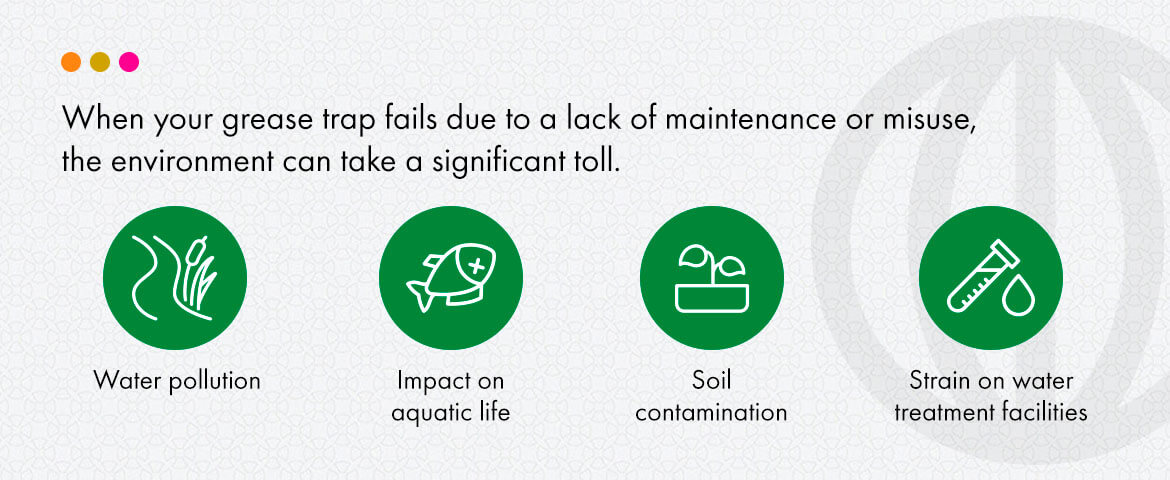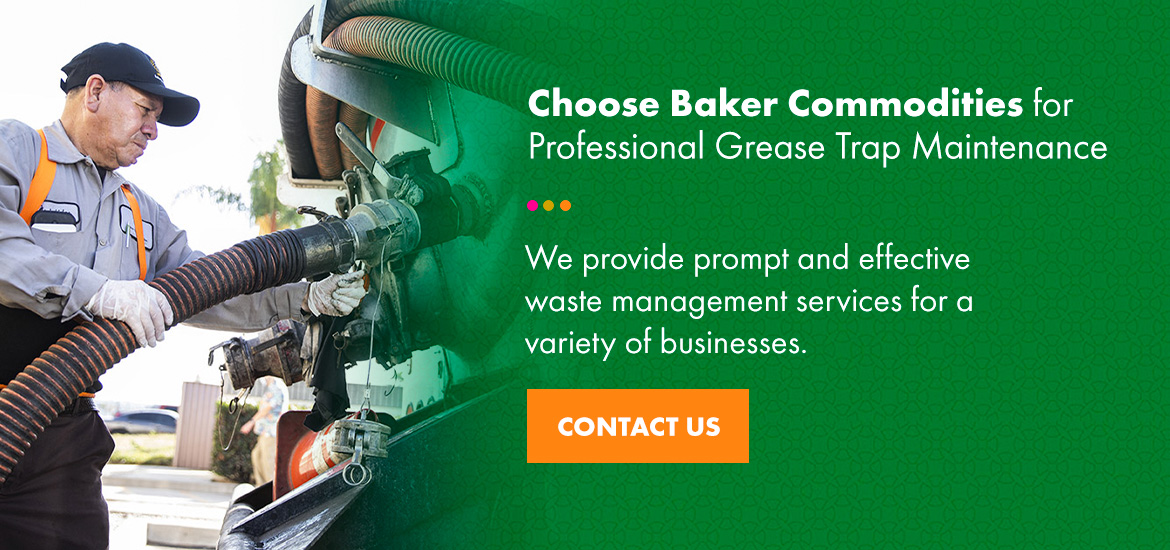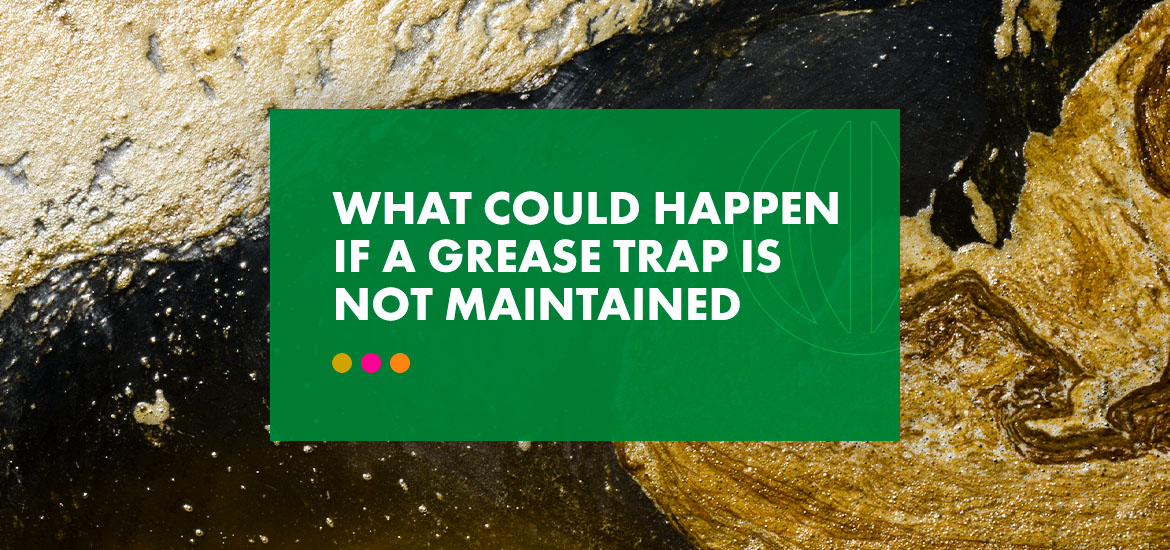What Could Happen if a Grease Trap Is Not Maintained
Grease traps are used in modern wastewater management to intercept fats, oil and greases (FOGs) from commercial kitchens before they enter sewage systems. The issue with FOGs is that they accumulate and solidify, causing problems if users don’t properly manage grease traps.
When FOGs enter the sewage system without being filtered, they can create blockages in the establishment’s plumbing system and the public sewer lines. These blockages lead to overflow, which contaminates local waterways and ecosystems. Sometimes, the overflow can lead to sewage backing up further down the line, causing health hazards and unsanitary conditions.
Understanding proper grease trap maintenance can help you ensure your establishment’s grease traps work as intended.
The Significance of Grease Traps for Your Establishment
Why does having a grease trap and maintaining it properly matter? Here are some ways that using a grease trap can improve your business:
- Catches FOGs: The primary use of a grease trap is to catch FOGs before they enter the sewer line. Without a grease trap, FOGs enter and contaminate sewer systems, leading to numerous compliance and health issues.
- Prevents drainage and sewer blockages: When FOGs go straight down the drain without a grease trap, they cling to the sides of the pipes — oil stays separate from aqueous substances that disintegrate or mix with water that washes away. Eventually, the buildup will cause a blockage.
- Minimizes health risks: Overflows and backups can lead to unsanitary conditions, posing health risks. Using a grease trap properly can help keep everyone safe by creating a cleaner, safer kitchen environment.
- Lowers plumbing costs: By keeping FOGs out of your building’s plumbing system, you can reduce your plumbing costs — especially because these buildups often require emergency plumbing service.
While food and beverage establishments can greatly benefit from installing grease traps, many other establishments should also install grease traps for better FOG management and compliance:
- Commercial properties: Any building with a kitchen — such as an employee kitchen in an office building — can likely benefit from a grease trap.
- Food processing facilities: Factories involved in making various types of food, including packaged meals, canned goods and other processed foods, should have grease traps. Specialized facilities for testing new food products and cooking methods will also require these traps to handle waste from their test kitchens.
- Schools and university cafeterias: Educational facilities with on-site food preparation areas require grease traps.
Why Does Regular Grease Trap Maintenance Matter?
A grease trap can only function as intended if you maintain it diligently. Without the proper care and use, your establishment can experience various grease trap problems that require immediate solutions. Here are some examples of why you should prioritize regular grease trap maintenance.
Environmental Impacts
When your grease trap fails due to a lack of maintenance or misuse, the environment can take a significant toll.

- Water pollution: When sewers overflow due to FOG blockages and related issues, the sewage can end up in surrounding rivers, lakes and oceans. This waste can flow into the surrounding groundwater, impacting any human, plant or animal that relies on those bodies of water.
- Impact on aquatic life: FOGs that enter the waterways create a layer on the water surface, reducing oxygen levels. A lack of oxygen leads to hypoxic conditions that affect aquatic organisms’ survival. One large-scale example of hypoxic conditions is the Deepwater Horizon spill.
- Soil contamination: In cases where sewage overflows and affects land areas, there is a risk of soil contamination. Contaminants seep into the ground and affect its quality. In land used for agriculture, those contaminants can enter the food chain through crop growth.
- Strain on water treatment facilities: Excess FOGs in sewage systems can put additional pressure on water treatment facilities. These facilities are designed to handle a certain level of FOG contaminants in low quantities. However, overloading them with FOGs from large plants and commercial kitchens can lead to considerable strain.
Legal and Reputational Consequences
Failing to properly maintain your grease trap can have legal consequences. Each state and municipality has laws and regulations regarding waste compliance, and you must follow these guidelines to ensure your establishment avoids potential legal consequences. In some cases, improperly disposing of FOGs from your facility can result in fines and penalties, revocation of licenses and permits, or corrective actions.
Establishments that don’t practice proper food waste management and neglect to maintain their disposal systems could possibly face reputational issues, as well. If a business isn’t compliant and those decisions have an impact on the environment or human health, patrons will be much less likely to work with or visit that business. As a result, establishments that ignore proper waste system maintenance could experience a decrease in profits.
How Often Should You Clean Your Grease Trap
Did you know that your grease trap can overflow even when it’s just a quarter full? Preventing your grease trap from reaching that level is a crucial part of proper maintenance. Additionally, you should clean your grease trap frequently — how often you do so will depend on your establishment’s waste output, though some businesses do so weekly. Partnering with an experienced Grease Trap Pumping company like Baker Commodities will ensure you are on the right schedule and help to prevent any citations and fines from your local regulators.
While maintaining your grease trap is crucial, it can be a complex, time-consuming process, and taking it on as an establishment could mean you miss crucial steps. That’s why it’s highly recommended to enlist a professional to do it for you. This way, you can ensure your grease trap performs at its best through compliant maintenance processes.
Grease Trap Preventative Maintenance
Choose Baker Commodities for Professional Grease Trap Maintenance
Maintaining your grease trap will help your company protect the environment, comply with regulations and keep your staff and customers safe.
At Baker Commodities, we provide prompt and effective waste management services for a variety of businesses. Through our Total Grease Management® services, our team can pump your grease trap for you and perform regular maintenance to keep it functional. Additionally, we can collect your used cooking oil to recycle and dispose of it accordingly. We even offer in-kitchen solutions to help keep solids and trash out of your grease traps, keeping them flowing and operating as they should.
Baker Commodities is committed to protecting the environment by using state-of-the-art technology to treat and recycle animal by-products and used cooking oil. Additionally, we provide 24/7 customer service, so we’re here for you when you need us. Contact us to learn more about our Total Grease Management® services today.




